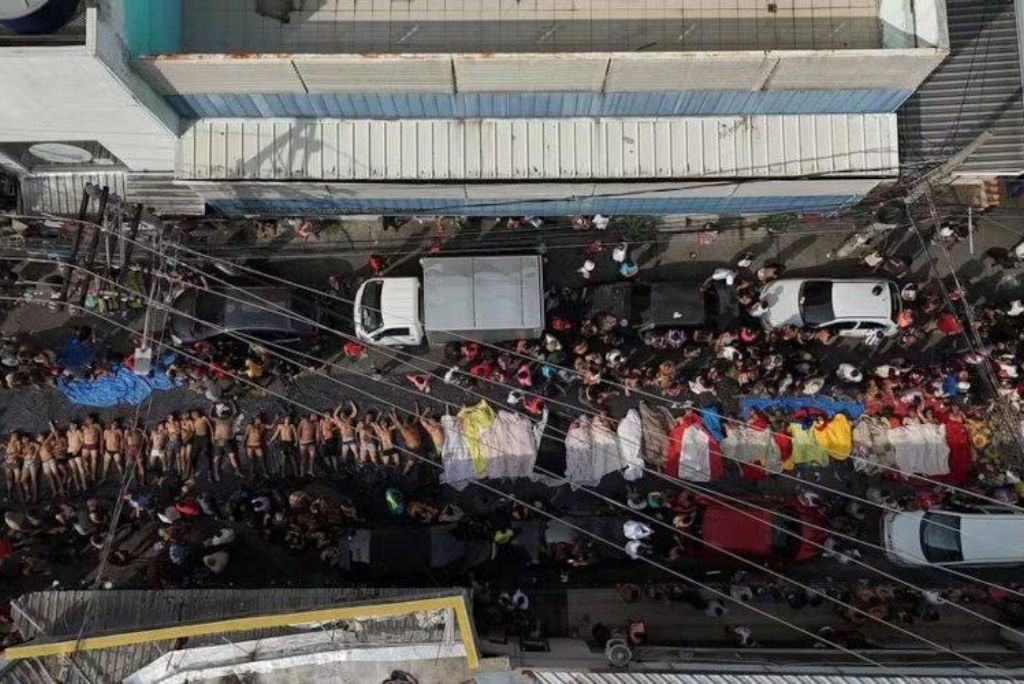
⭐️⭐️⭐️⭐️⭐️
This Tuesday, October 28, 2025, an unprecedented anti-drug trafficking operation stormed the Penha and Alemão favela complexes—two bastions of terror in Rio de Janeiro’s north zone—leaving a devastating toll of 64 dead, including four brave law enforcement officers, and 81 detained.
Nearly 2,500 heavily armed police officers were mobilized, backed by 32 armored vehicles, two helicopters, and surveillance drones.
The forces responded to the escalating violence orchestrated by the Comando Vermelho (CV), Rio’s most dominant and brutal criminal faction, responsible for flooding the streets with drugs and death.
State Governor Cláudio Castro spared no words in describing the action as “the largest operation in Rio de Janeiro’s history” against the CV—an organization born in the 1970s inside Carioca prisons and which today controls much of the cocaine and marijuana trafficking in the region.
According to the Civil Police, the operation—internally codenamed “Containment”—aimed primarily to dismantle the gang’s logistical and armed structure, executing court-issued warrants to capture at least 100 alleged ringleaders.
Among the priority targets was Edgar Alves de Andrade, alias “Doca,” the local CV boss in the Penha Complex—a critical hub of criminal activity that houses nearly 300,000 residents trapped in a maze of poverty and gunfire.
The drug traffickers’ resistance was fierce and technologically sophisticated—a reminder of how these hordes have modernized to challenge the State. CV members erected barricades using burned vehicles to block police advances, cutting off avenues and streets in retaliation across the city.
But the most alarming development was the use of weaponized drones to drop explosive bombs on officers—a tactic that Castro publicly denounced on social media, posting videos showing the chaos: “This is how Rio’s police are greeted by criminals: with bombs dropped from drones.”
This lethal innovation, combined with intense shootouts that echoed throughout the morning, turned the favelas into an urban war zone, with columns of smoke rising over precarious rooftops and helicopters hovering above a skyline of misery.
The seized material speaks for itself regarding the depth of criminal infiltration: around 50 firearms, including 31 assault rifles restricted to the Brazilian Armed Forces, stolen or smuggled through porous borders with Colombia and Peru.
The CV, which operates in federated cells led by both free and incarcerated bosses, does not merely traffic drugs; it imposes strict rules and brutality on communities, funding local events to gain loyalty while extorting the most vulnerable.
This operation is not excessive but an imperative necessity. The opposition, with its “human rights” rhetoric that often masks leniency toward crime, has harshly criticized similar interventions—such as the September 2025 bill in Rio that financially incentivizes police to neutralize threats rather than arrest them.
Its recent expansion into the border Amazon region worsens the crisis, turning Brazil into a global corridor of poison that undermines hemispheric security.
Organizations like Human Rights Watch have warned of “incentives to shoot,” but what alternative do they offer? Allow the CV to keep expanding, killing officers, and poisoning generations? In 2024, police operations in Rio caused around 700 deaths—nearly two per day—but also dismantled networks that would otherwise devour society.
Brazilian police, among the deadliest in the world, lose 10% of their personnel in these clashes—a heroic tribute to the defense of order.
Governor Castro lamented the lack of support from the Armed Forces, whose requests for additional armored vehicles were rejected three times, stressing that «Rio is alone in this war» against international drug trafficking fueled by illegal weapons.
The 2021 Jacarezinho operation, with 27 dead, pales in comparison; this is the deadliest on record, yet also the most strategic, planned over more than a year with prior intelligence to map nine million square meters of hostile territory.
While the CV seeks to go “toe-to-toe” with the State, Rio sends a clear message: the law does not negotiate with terrorists disguised as “community leaders.”
This battle does not end today. With the operation still in subsequent phases, the CV lurks in the shadows, but the courage of 2,500 officers has reminded us that the Brazilian State, despite its flaws, will not surrender to chaos.
About The Author
⭐️Singer/Songwriter/Voice Talent/Actor/Media Personality⭐️
Born in Syracuse, NY. He holds a bachelor of science degree in communication from Florida Institute of Technology with specialization in technical writing, business, public relations, marketing, media, promotion, and aerospace engineering.
⭐️ Las Vegas Entertainer ⭐️ MTV uplaya Platinum Auddy Award Winner ⭐️ Southeastern FTTF Talent Champion ⭐️ Movies & TV ⭐️ Listed in ‘Who’s Who’ publication ⭐️ Voted ‘MOST MARKETABLE’: Sonic Records ⭐️ U.S. Veteran ⭐️
